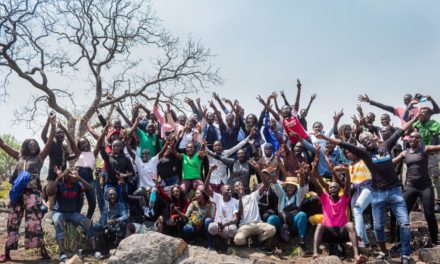
Normalize Menstruation: Break the Taboos and End the Stigma Surrounding Periods.

By Dennis Daniel Mwanza, PhD.
I remember mentioning to my wife that I was traveling for a menstrual hygiene day commemoration and her immediate reaction was – really!
The whole Chief of Party traveling for Menstrual Hygiene day! Today the reality dawned on me as I heard for myself the struggles many young women silently go through, the stigma they face and worse still for those in rural areas where issues of availability and affordability of appropriate sanitary pads are a reality and fact of life.
I consider myself to be very free with my daughter, yet one area I never discussed with her was periods! That was a woman’s issue to be discussed with her mother or so I believed.
At least one thing I never did, however, was to question her if she asked for more money than she needed to meet the cost of a particular service or item that she openly wanted to do.
Deep down in my heart, I knew that I needed to give her more money than she needed for her feminine needs because if I did not, she would get it from the wrong person – a protective dad!
I believe I speak for many African men not only in my age group but generally on the issue of monthly periods as something we never talk about either with our daughters and certainly never under a tree in the villages or in the watering holes for the urbanites.
Not that we have never cared, it has just never managed to slip into our agenda.
My appeal is for us to create an environment and room for our daughters or nieces to freely express their needs regarding periods.
Can men give proper counseling to their daughters and nieces about the true meaning of menstrual periods? Why not!
Most times especially in rural areas, a lack of knowledge on menstrual hygiene leads to teen pregnancies which could have been avoided.
First, we must empower and counsel our young women and girls that they are not alone. This is an experience every woman goes through at one stage in her life, and it is not taboo to openly discuss it with your father or uncle or mother, or auntie.
Families including brothers need to support our young women not only financially but just awareness.
I was a guest of honor at a Menstrual Hygiene Day in Wau City, Western Bahr el Ghazal state North West of South Sudan, more than 150 youths – about 70 percent were young women and the rest were young men – gathered at a community center in Wau to commemorate this lowly advertised day global day.
I donated on my own personal accord, sanitary pads which were received with mixed reactions as many were surprised that a man would go out of his way to provide menstruation products to their girls.
Menstrual Hygiene Day is an annual awareness day celebrated on May 28 to highlight the importance of good menstrual hygiene management at a global level.
It was initiated by the German-based NGO, WASH United in 2013 and was observed for the first time in 2014 and has continued to be observed ever since.
It is the one day in a year to highlight the importance of menstrual care to young women and men like me and raise awareness about the issues faced by those who don’t have access to sanitary products.
This year’s theme has been; “making menstruation a normal fact of life by 2030 with an overarching goal of building a world where no one is held back because they menstruate.”
Menstruation is not a crime nor is it something to be ashamed of but something every young woman needs to be proud of, perhaps even look forward to.
Yet in a country like South Sudan, how many girls go through so much stigma because of some cultural norms?
I work for a program (USAID funded Afia WASH) that is seeking to expand gender-transformative sustainable access to basic safe drinking water, and basic sanitation coverage, and increase uptake of key hygiene behaviors to improve health and household resilience.
Under the gender norms, we partner with organizations in trying to reduce the stigma that our young women go through and create awareness of menstrual hygiene. Sustainability is key to any development agenda.





















Recent Comments